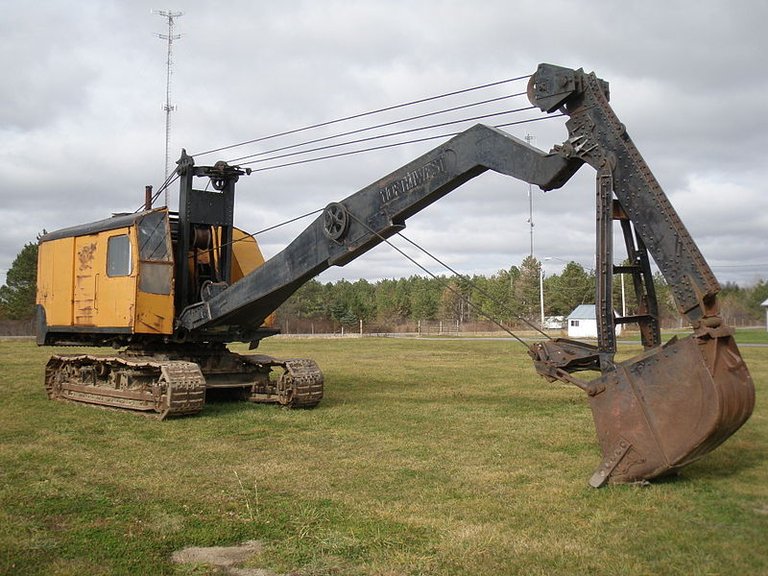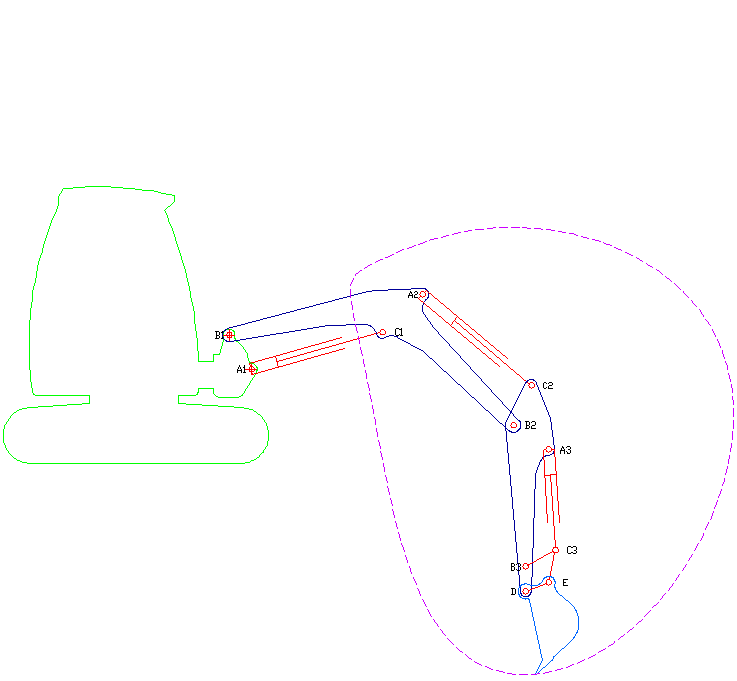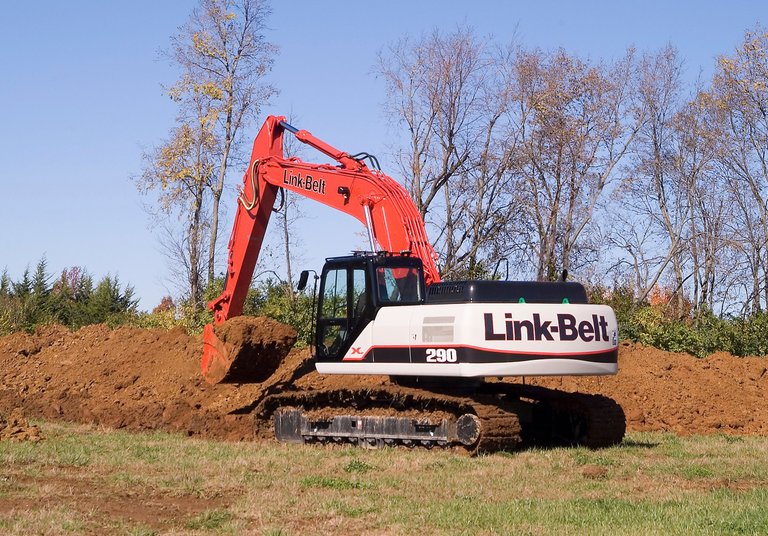
Children are watching the excavators work. Image credit @kharrazi
Who is not familiar with excavators, heavy equipment that is often found in almost every construction job, this heavy equipment has been helping human work for a long time and is now increasingly being developed.
Today I will discuss this machine and try to make the calculation of production capacity hourly, so you can determine how long the excavator you have to lease to finish your work because usually excavator you can rent with relative cost per hour.
We'd better get to know this heavy equipment closer.

An old excavator that still uses the wires as an arm drive [image source]
All excavator components are driven by a hydraulic system, the system has previously used steam that is prominent with Power Shovel.
In 1835, Sir William Smith Otis created the excavator by utilizing a steam engine, this first generation excavator serves to dig up the construction of railroads. Otis received a patent for his work in 1839, the same year of his death.[source]
Excavator has various components, such as stem (hand), rotary house, chain wheel and so forth. Currently, excavators have evolved from heavy equipment that serves as excavators can also be other heavy equipment, such as tools to destroy concrete and so on, excavators are needed in medium-scale construction work and in mining areas such as coal mines and so forth.
Modern excavators have various types and sizes and can be used as.[source]
- Dig a hole
- Lifting material
- Cutting material
- Leveling the ground
- Plug a pile
Functions and excavator parts.[source]
- Bucket: Dredge
- Bucket cylinder: Moving bucket
- Arm cylinder: Moving arm
- Boom cylinder: Moving the boom
- Arm: Moving a bucket
- Boom: The arm lever moves up and down
- Cabin: Control room
- Tracker: Wheel
We will calculate the productivity of excavators per hour, using a standard excavator with a 0.93 m3 bucket capacity, and this number may change according to the type of excavator.
Question.
What is the productivity of standard excavators per hour during excavation with a depth of 2-4 meters?
Is known.
| Information | Code | Coefficient | Unit |
|---|---|---|---|
| Material development factors | Fk | 120 | Percent |
| Bucket Capacity | V | 0.93 | m3 |
| Bucket Factor | Fb | 1.00 | - |
| Efficiency Factor Tool | Fa | 0.83 | - |
| Conversion factor, depth <40% | Fv | 1.00 | - |
| Material Weight Content | Bim | 0.85 | - |
| Cycle time | Ts1 | - | Minute |
| - Digging, loading and others | T1 | 0.32 | Minute |
| Cycle Time = T1xFv | Ts1 | 0.32 | Minute |
| Production Capacity / Clock = (VxFbxFax60) / (Ts1xFk) | Q1 | 120.61 | M3 / Hour |

The principle of a hydraulic excavator. [image source]
In fact, the bucket will become increasingly difficult to fill as the excavation deepens, so to get a fully charged bucket requires several extra movements that cause longer movement cycles.
What is meant by the bucket factor (Fb) is the level of soil hardness, with easy scores (1.1-1.2), moderate (1.0-1.1), somewhat difficult (1.0-0.9) and difficult (0., 9-0.8). While the meaning of the excavation factor (Fv) is a 40% dig depth condition with an easy score of 0.7, normal 0.9, rather difficult 1.1 and difficult 1.4.
The efficiency factor (Fa) is the instrument operating condition, with a score of either 0.83, moderate 0.75, slightly less 0.67, and less 0.58.

The excavator was created by Sir William Smith Otis initially to ease the excavations on railroad construction work in 1835 and Otis received a patent four years later.
Currently, excavators have been growing and in accordance with the needs, such as the existence of mini excavators that function to clean the channels in the city and village, also has also created a large size excavator, has a large bucket capacity as well.
In accordance with the above sample calculations and in accordance with the technical analysis then for the average production capacity of the standard excavator with a depth of 2 to 4 meters of excavation is 120.61 m3/hour.
This calculation has included shrinkage factors and other external factors, also taking into account the arm cycle and average rotation of the excavator at work.
By knowing the productivity of excavators per hour then you can determine how long you can rent this heavy equipment to complete your work to make it faster and save money.
This calculation is only an example and can be used by anyone, this calculation is in accordance with a technical analysis and can be developed in accordance with the needs of a field.
This is the only thing I can write on this occasion, over all the mistakes and lack of unintentional writing as a servant of God, I apologize.
Thanks to friends who have visited this blog and provided constructive comments, as well as scientists who are willing to sacrifice their time for a better civilization.
Active link reference:
Do you love science? by respecting the work of others and not plagiarism then you are welcome to join steemSTEM by using @science tags, you can also chat with us in steemit chat/steemSTEM channel.

Best regards @kharrazi
so interest, i like it...
bro, cool stuff as always!
now i know why i see the Otis sign on many of such excavators ! :)
These Great Excavators do awesum work these days very easily!!! And help labour to prevent hard work!!! Gud Techniques!!!
Yup, because it was he who created such a useful cool technology, thanks for stopping brother :)
Woo good post! I love diggers. Great to see the detail of the bucket mechanisms at work
Owww, thank you @mobbs :)
nice post
Link-Belt would rank #1 in my past experience-